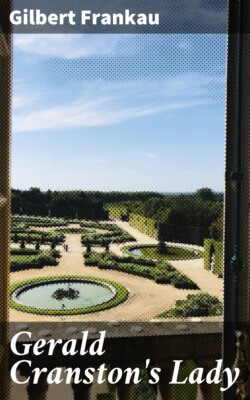Читать книгу Gerald Cranston's Lady - Gilbert Frankau - Страница 18
На сайте Литреса книга снята с продажи.
1
ОглавлениеTable of Contents
Hermione, explaining the chance of Ibbotsleigh’s visit to her husband, could not help comparing the two scarlet-coated men. In demeanor they were identical—polite, if a shade under the effusive. But there the likeness ended. Though Gordon stood nearly six feet, her husband seemed to overtop him by inches. In every way, too, her husband looked the broader, the more powerful. He had, as it were, a presence before which the other’s lean, wiry frame shrank to littleness. Taking advantage of her opportunity, she bade her guest good-by and went up-stairs to her bath.
Left alone, the pair, still standing, fell into desultory conversation.
“Had a good day, Cranston?”
“Not bad, and you?”
“Oh, pretty fair.”
“I suppose Hermione told you that you’re our first visitor.”
“Yes.” Ibbotsleigh tapped his mired boots. “I happened to be in the neighborhood and”—casually—“of course I couldn’t resist the temptation of calling.”
“Well,” Cranston’s tone sounded equally casual, “let’s tempt you again. Have a drink.”
“Thanks, I’ve had one.”
“Have another.”
Ibbotsleigh would have continued to refuse. Though the meeting had turned out less difficult than anticipated, he felt awkward—an intruder anxious to depart. But Cranston’s blue eyes were on him, appraising him; and finally he yielded with a reluctant: “Just a spot, then. But I mustn’t stay more than a minute or so, or the nag’ll be getting cold.”
“Say when?” Cranston’s tone, as he poured the two drinks with a firm hand, continued casual; but his blue eyes still appraised their man. Vaguely his intuition realized itself puzzled. Vaguely he remembered that somewhere, somehow, his brain had registered an impression, a scrap of private knowledge, about this unexpected guest. Yet though—much as a girl racks an office-file for a missing letter—he racked his brain for trace of that missing impression, he could not recapture it. Momentarily the scrap of private knowledge, whatever it might be, had vanished. “Seems a pleasant enough sort of fellow,” he decided, finishing his unobtrusive scrutiny and lifting his glass with a quiet, “Well, here’s the best.”
“The same to you.” Gordon Ibbotsleigh tossed off half of his drink, and continued to make conversation.
“By the way, aren’t you a mining engineer?” asked Cranston, at a pause in their talk.
“More or less.” Ibbotsleigh nodded. “I rather specialize in tin.”
“Tin’s hardly in my line of country.” The other spoke slowly—a sign that he was interested. “I know a certain amount about oil; and coal, of course, is more or less my stock in trade.”
“Tin’s more like coal than oil,” said Ibbotsleigh. “As a speculation, the general public aren’t interested in it. They don’t even know the difference between rock and alluvial. I often wish I’d specialized in something more popular—gold, for instance.”
“Still”—Cranston spoke slower than ever—“there must be profits in tin.”
“And losses.” Ibbotsleigh laughed, a soured cynical laugh. “I ought to know. I’ve dropped two fortunes over it. One in West Africa, and one in the Federated Malay States.”
“Really.”
They talked tin mining for a further five minutes. After which, the visitor took himself off.
“Got brains, that fellow,” mused Cranston, watching the gray disappear into the gathering darkness; and—his mind once again searching vainly for its lost impression—turned back into the house.
